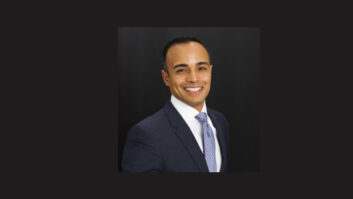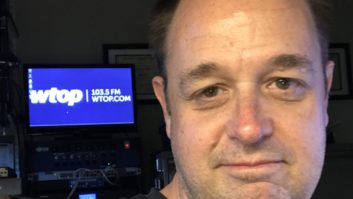“What we’re really trying to do here is try to dispel the myths about the radio industry, explain to people the good things that Clear Channel does.” – Andy Levin
WASHINGTON Andy Levin, Capitol Hill insider, is chief lobbyist for Clear Channel Communications. Just this year, the radio giant established a Washington presence separate from that of its regulatory counsel, Wiley, Rein and Fielding, the law firm that handles Clear Channel’s business with the FCC.
While major television networks have legislative lobbyists at the federal level — and their radio divisions can take advantage of that expertise — most radio groups not co-owned with a TV network typically rely on the NAB to lobby for them, or retain lobbying firms for specific issues.
Pundits said Clear Channel opened a Washington office in January to battle negative publicity that the company, and radio in general, have been receiving.
Levin is on an intimate footing with communications policies; he was a staffer for the House Energy and Commerce Committee when the Telecom Act was debated and passed.
Radio World News Editor/Washington Bureau Chief Leslie Stimson spoke with Levin about life in the political trenches.
RW: Why did Clear Channel establish a Washington office?
Levin: I think most companies Clear Channel’s size have a Washington office. It was unusual that Clear Channel went as long as it did without one.
But it was understandable because Clear Channel didn’t become as big as it is until fairly recently. …
RW: What are you trying to accomplish?
Levin: The biggest challenge that we have is to try to educate people about who we are and what we do.
Unfortunately, there have been an awful lot of allegations and misapprehensions and misunderstandings about our business. And because we weren’t here (in Washington) earlier, to tell people the real story, those allegations and myths got traction and got a bit out of hand.
What we’re really trying to do here is try to dispel the myths about the radio industry, explain to people the good things that Clear Channel does.
RW: What are some of those myths?
Levin: One of the myths is that big is bad.
A lot of people think that as a company gets bigger, its interest in the local community necessarily diminishes. It couldn’t be further from the truth.
Clear Channel is a very large company. It owns a lot of radio stations. But it doesn’t matter whether you own five stations or 100 stations. If you’re not paying attention to the community that you’re serving and providing the kinds of entertainment, news and information that they want, you’re not going to be in business very long. …
It’s gotten a bad rap lately in that people are accusing radio of becoming less localized and more national. But it simply isn’t true. We have to provide our listeners in Dallas, Texas, with a different kind of programming than we provide our listeners in Detroit, Michigan. If you compare the playlists between the two cities, you’ll see that even in the same format we play very different kinds of songs.
RW: Tailored to that –
Levin: Tailored to that audience, exactly. That’s another myth specifically about Clear Channel, that we’re playing the same playlist everywhere, that it’s a standard playlist and that it’s dictated out of corporate from San Antonio, Texas.
RW: I believe that’s the position held by those who oppose voice tracking. Clear Channel and voice tracking are synonymous in some people’s minds.
Levin: Voice tracking is an issue. I think that a lot of people sort of look at the past through rose-tinted glasses. They think that radio 20 years ago was so much better than it is today. And I’m not sure that that’s true. In fact, I would say it’s the opposite.
Today, radio has so many more diverse formats on the air. It reaches so many different audiences than it did 20 years ago. … But opponents of deregulation will always argue that things were better in the past than they are today.
RW: When stations were losing money…
Levin: That’s exactly right. The notion that deregulation was bad for the industry is another myth we try to dispel. Most people don’t remember that just 10 years ago stations were losing a lot of money. It was hard to sell a station. There wasn’t capital out there. It had pretty much dried up for radio. …
RW: How do you think it’s going, your efforts to turn around the myths?
Levin: It’s only been a short time since we opened the office here and it does take some time to ramp up; but I think we’re doing a great job so far. I can tell by people’s faces when we go into to talk to them and explain the facts around certain issues that they’ve heard and sometimes their jaw just drops wide open.
When they hear, for example, that radio is the least-concentrated segment of the media industry, and we show them the data, the statistics … the numbers that the Justice Department itself uses when evaluating how concentrated an industry is. And they can tell from that objective data that radio is the least concentrated, much less so than television or newspapers.
RW: What is Clear Channel’s position on the local radio ownership limits? Does Clear Channel think eight as a cap is fine, or that they should be raised or eliminated?
Levin: Our view is that the FCC made a big mistake in the order. … They addressed sort of the competitive anomalies that occurred in smaller markets based on the old rule. They didn’t take a look at similar anomalies that occur in large markets.
The current rule is that you can own a maximum of eight stations in markets that have 45 or more total radio stations. So that means that markets like New York City and Chicago and Los Angeles, that have nearly 100 radio stations, are treated just the same as markets like Memphis, Tenn., that has 47 stations.
We believe that there really ought to be different treatment for the largest U.S. cities where there are not only a tremendous number of radio outlets, but also a tremendous number of other media voices: newspapers, television stations, all kinds of outlets. …
RW: How high should the limits be in the biggest markets?
Levin: It’s hard to say; I wouldn’t want to pick a number, specifically. Certainly, I know it’s not the same number as Memphis.
(Editor’s Note, As Radio World went to press, the U.S. Court of Appeals for the 3rd Circuit in Philadelphia granted a request from the Media Access Project to stay the new media ownership rules, which were due to take effect Sept. 4, pending the results of legal challenges and Congressional initiatives. NAB and three of the four major TV networks filed separate challenges to various portions of the rules. It remained unclear how long the stay would last. In the meantime, the FCC’s previous media ownership rules remain in force.)
RW: What does Clear Channel think about the intended new radio market definition? The Arbitron Radio Metro…
Levin: We opposed that quite strenuously at the FCC.
We knew from the beginning that the FCC was going to look at the radio market definition. We knew that there was political pressure to do something about Minot, N.D. and markets like it, where the old radio market definition may have resulted in companies being able to own more stations in those smaller markets than, perhaps, Congress intended.
RW: Sen. Byron Dorgan, D-N.D., mentions Minot frequently at communications hearings; he doesn’t think it should be part of the Bismarck market.
Levin: Sen. Byron Dogran really put Minot on the map. But we had no objection and understood the FCC’s desire to change the market definition to take care of those few anomalies around the country, like Minot. In fact, we suggested various ways, along with other radio companies, to fix that problem.
Unfortunately, instead of taking a surgical approach to the old market definition and making the necessary changes to correct for what created the so-called “Minot problem,” the FCC decided to throw out the entire rule and start again. So they’ve picked up the Arbitron idea and we pointed out, as well as many other radio companies, that there were a host of problems inherent to the Arbitron system. …
We think it was a big mistake and we would advocate going back to the pre-existing definition with some modifications to adjust for those few market anomalies that existed.
RW: Such as modifications to the contour overlap rule the FCC decided to use on a temporary basis while it conducts a rule making for defining radio markets in areas not rated by Arbitron.
Levin: Yes, the 58-mile contour suggestion was something we had submitted during the comment process, and the FCC adopted that as an interim rule for markets that are un-rated by Arbitron.
But we don’t see any reason why that shouldn’t be extended to all markets permanently. That would correct those problems that the FCC was trying to correct. …
(Ed. Note: The FCC would have excluded from a market any station whose transmitter is more than 58 miles from the perimeter of the area where the contours of the stations to be combined overlap. The idea is to cut down on some of the unusually large markets that can occur when a large signal contour that is part of a proposed station combo overlaps the contours of distant stations and brings them into the market.)
RW: Do you think Clear Channel would have needed to spin off some stations after the two-year waiting period, under the new market definitions?
Levin: The FCC did one good thing for radio, in that when they redefined the market, they grandfathered existing companies ownership of stations that would be non-compliant with the new rule.
We don’t consider that a huge victory because it’s hard to imagine in this country that it’s a big win to be able to keep property that you already bought, legally. But, nevertheless, we’re satisfied and content that we’re grandfathered; but at the same time, we strongly believe that the definition is inappropriate. It hurts radio operators both large and small and ultimately, the public.
RW: At a hearing recently, a small operator from the Eastern Shore of Maryland testified that the new radio market definition would hurt the small companies because they won’t be able to grow and fight off the big guys to acquire clusters.
Levin: That has some truth to it. Everybody’s sort of frozen in place with the new rule, and while some people may say that that benefits Clear Channel, we don’t look at it that way. Every company has to grow in order to sustain itself. …
RW: Is Clear Channel going to file a petition for reconsideration, or go the appeal route?
Levin: Our folks are looking at a lot of different alternatives internally and we have some time yet to decide yet under the rules to decide what we’re going to do in response to this. NAB announced (in late July) that they were going to appeal to the courts the legality of the new market definition as well as the new rules dealing with TV duopolies. We certainly support that effort by the NAB.
RW: Is Clear Channel going to remain an NAB member?
Levin: I think NAB does a terrific job for its members and we have no intention of leaving.
RW: Drawing from your experience as a staff member of the House Commerce Committee when Congress was debating the Telecom Act, do you think they knew what they were doing as far as radio in that Act? As a reporter covering that issue, I witnessed first-hand far more debate about telephony and television issues than radio issues.
Levin: I think radio was a much easier issue in the ’96 Act than some of the other things that the folks were dealing with on the Hill. Because we could see very clearly what the existing rules were doing to the industry. So I think there was less discussion, less debate about what the solution ought to be with regard to deregulation than there was with the other segments of the industry.
RW: There were national limits in addition to the local limits…
Levin: Exactly. Over the years the FCC had deregulated radio in certain ways, as they started to recognize that it was a highly competitive market (and) there was less need for regulation. But, still, in the early ’90s it was heavily regulated, with ownership limits on a local and a national level; and it was starving the industry. …
They dropped more stations in, but nobody could own more than two FMs in a market, so you ended with all of these formats competing against each other. The same format competing against each other all over the band and listenership was splintered so much that you couldn’t make money in the business. …
It was a pretty clear case where government regulation was unnecessary due to intense competition in the market. And not just unnecessary, but counterproductive to the health of the industry. So yes, I think they knew what they were doing.
RW: Do you think Congress is going to be successful in beating back some of the ownership rules?
Levin: Yes, I think the opponents of what the FCC did will have some measure of success, ultimately. I would predict that it will be in the TV area and it will simply be a rollback of the national ownership cap from 45 to 35 percent. That seems to be the issue that has the most traction with members. It’s the one that’s most easily understood, by members and by the public. …
RW: Rep. Maurice Hinchey, a Democrat from New York, wants to bring back the Fairness Doctrine; other members of Congress have suggested re-opening the Telecom Act. How likely are any of these bills to go anywhere?
Levin: I don’t think any of it really has much traction. There’s always somebody, in every session of Congress, who wants to bring back the Fairness Doctrine. There’s always somebody that wants to provide free airtime for political candidates. There’s always somebody that wants to do a spectrum fee bill and use the money for one thing or another. …
These things come back perennially. I don’t see that there’s any more solid support that would (help) any of those issues to pass than there has been in the past. A lot of these issues are used for political purposes to gain points at home and not necessarily with any serious expectations of legislating.
RW: At one point, you were a leading candidate to fill an open commission seat. Is that something you’d still like to do?
Levin: I’m really enjoying what I’m doing now. I think that (FCC commissioner) has got to be one of the toughest jobs, particularly in this environment.
RW: What do you believe all the rumors about Chairman Michael Powell possibly leaving?
Levin: I wouldn’t be surprised if he left. I don’t think if he left it would be because of the criticism he’s gotten as a result of (the ownership rules), but I think he’s been (a commissioner) for close to seven years, and I’m sure that’s long enough for anybody.
No matter what you do as chairman of the FCC, somebody’s going to be coming after you and say you did the wrong thing. That’s got to be hard to live with day in and day out. So I wouldn’t be surprised if he left at some point in the near future, although they’re saying that he has every intention of staying.
RW: What is your opinion of digital radio?
Levin: I think it’s going to be great. That’s an example of another thing that probably wouldn’t have happened without deregulation. Those are the kinds of new technologies and new services that companies can begin to look at when they’re in a favorable regulatory climate, when they’re doing well financially, and those things, absolutely, accrue to the benefit of the public.












